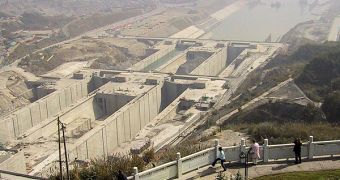The North-south water route is an enormous project devised by Beijing, which promotes the construction of several new canals, meant to unite the country's four main rivers – the Yangtze, the Yellow River, Huaihe and Haihe. Once completed, around 2050, the project will offer Northern Chinese cities, plagued by diminishing water reserves, some 44.8 billion cubic meters of the precious liquid, to be used to quench the thirst of many industrialized cities, including the capital.
Approximately 1,267 km (787 miles) separate the Danjiangkou Dam, in the middle of the Hubei province, from the Chinese capital, yet a link between the two locations was scheduled to be completed by 2010. Now, authorities have announced that they've pushed back the deadline for the completion of the project, over pollution-related concerns that several organizations brought forth.
Ecological strains also prompted the halt, as water experts say that if they started to operate the canal at this point, the country would literally punch a hole in its fresh water balloon. Rerouting such massive volumes of water will have a major environmental impact, especially on the people living downstream from the place where the water will be diverted.
Understandably, the amounts of water that will escape the retrieval project will significantly reduce the volume of water circulating downstream, and some fear that the government may have just traded one problem for another.
"To prevent ecological and environmental risks to the South-North Water Diversion Project, completion of the central route will be delayed for 4 years. This means Beijing residents will have to wait another 6 years before they can drink high-quality water from the Dankiangkou Dam," says Hubei project official, Wang Fenyu, who is involved in the project.
The main problem with these canals is the fact that they will place enormous strains on already battered national water reserves, which could prompt a collapse of the entire system, international experts warn. But Beijing now finds itself in a sensible situation, as the Northern part of the country is home to the economic "boom" that propels the country forward, while the Southern part provides most food.

 14 DAY TRIAL //
14 DAY TRIAL //